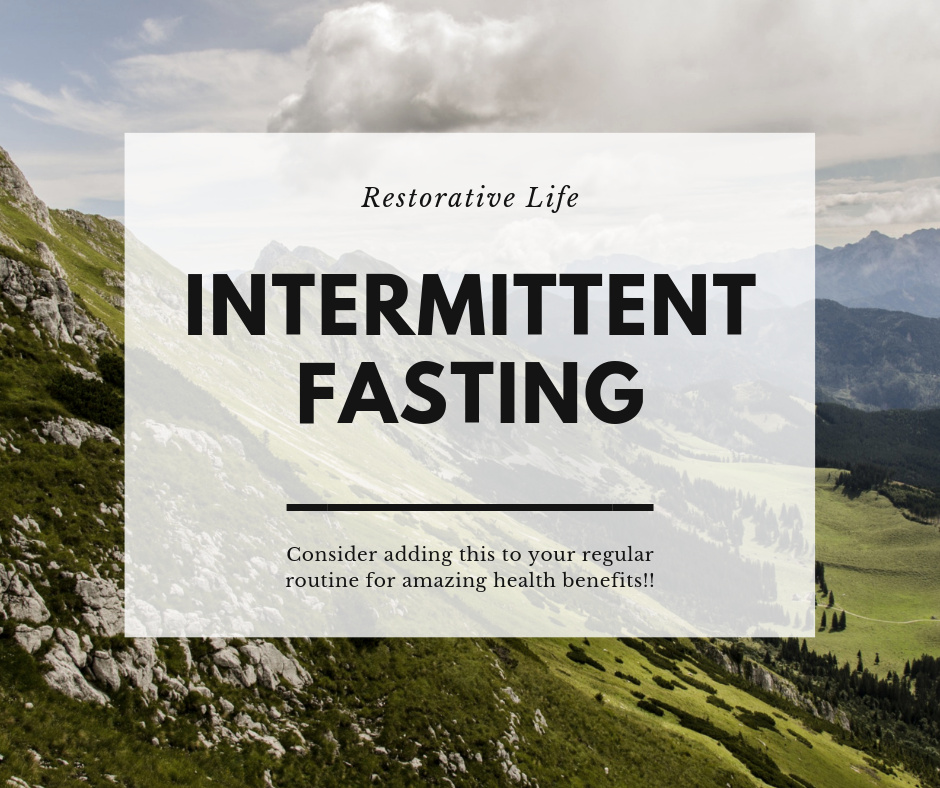What you need to know about Intermittent Fasting
IF, or Intermittent Fasting, is a popular practice these days and with good reason. In case you are new to the game here, intermittent fasting is extending the period of time between meals each day. So instead of eating during a 12-hour window, from 7 am to 7pm for example, the total hours of eating during the day is reduced to 8 hours or less. For most people this means skipping breakfast and eating brunch or lunch later in the morning or midday.
What are the benefits of IF?
There are a multitude of known benefits to gain from practicing IF on a regular basis and more studies are being published each week. Some highlights include:
- IF promotes caloric efficiency leading to enhanced cellular repair. Too many calories too often accelerate the aging process due to constant and excessive caloric energy needing to be processed. This leaves little to no time for digestive, hormone, and other systems to regulate and repair.
- IF stabilized insulin levels and can be a tool for preventing and even reserving T2 Diabetes.
- IF removes waste material from the cells making it great for detoxing.
- IF gives you more energy leading to more productivity!
- IF promotes brain health. When the body isn’t occupied with digestion, more resources can be sent to the brain leading to improved focus, better memory, and increased clarity and efficiency.
- IF reduces sugar craving and hunger sensations. This may not happen instantaneously, but after practicing over time, there will be noticeable changes.
- IF and longer fasting is being used as a part of cancer treatments as studies show it to slow tumor growth and limits the spread of cancer
- IF is being studied for protecting against Alzheimer’s Disease and Dementia
- IF reduces the risk of obesity promotes healthy weight maintenance.
Isn’t breakfast the most important meal of the day?
This is a tricky one because it’s been so ingrained in our collective psyches that breakfast if the most important meal of the day. That is the power of propaganda my friends. Historically, it was always a common practice to do work upon waking and eat the first meal later in the morning or even midday. This began to change during the era of industrialization when people would be away from home all day and would need to consider meals on the go or kept to a strict schedule.
The real culprit of our flawed thinking traces back to cereal companies in the early 1900s. They wanted to increase sales of the newly available processed food and the marketing began encouraging the masses to consume cereals for breakfast (and even for lunch) because “breakfast is the most important meal of the day.” This article published in the Daily Telegraph in August 2018 explains some of the history of breakfasts and how the Kellogg brothers and lifestyle changes stemming from industrialization changed our collective perceptions of its role in our nourishment.
What time should I eat my first meal?
The word breakfast comes from the two parts, Break + fast. Whatever time is the first time that you eat in the day is when you are breaking the fast from the night before. While it’s more common to practice intermittent fasting with a shortened eating window lasting from midday into the evening, it’s also possible to eat from morning to afternoon, as in from 8am-4pm and then skip dinner. It really depends on personal preference and scheduling considerations as to whether it’s easier to skip breakfast or dinner.
How often should I practice Intermittent Fasting?
Some people have great success practicing IF every day and become accustomed to increased energy levels, easily maintained weight regulation, and reduced cravings. For others it works best to practice IF 1-2 times per week. It is recommended to start moderately and build up as your body becomes more used to it.
Additional benefits of IF
Since IF basically means skipping a meal or two, it’s a great economical option for improving overall health. No need to buy expensive supplements or fancy ingredients, simply don’t eat. You’ll get all the health benefits and spend less money.
Furthermore, Looking at the list of known benefits, there’s no reason that everyone shouldn’t be doing IF at least on occasion to support health and vitality. At the end of the day, it’s a very low-risk experiment. Head out in the morning with either a packed meal or a plan to grab food whenever you get hungry. Since everyone is a little different you’ll need to try it to see how it works best for you and your lifestyle and routines.
Where can I get more information on Intermittent Fasting?
IF is so popular that a will get a full download from a simple Google Search and there are even Facebook groups dedicated to Intermittent Fasting. Dr. Jason Fung is considered to be an expert on Intermittent Fasting. He has written several books and articles and also has videos available online to learn more.
When should I start Intermittent Fasting?
Start anytime, but I suggest starting on day that you are very busy and occupied with plenty of tasks. It’s much easier not to think about eating when there is a lot going on and many distractions.







